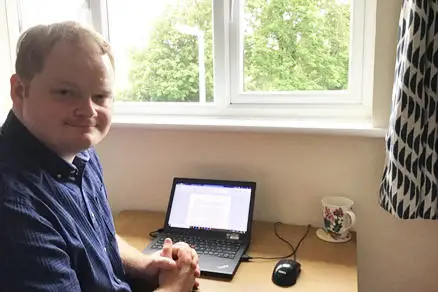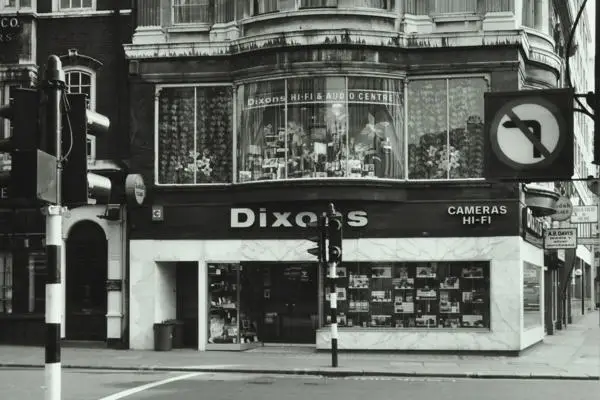Archive apprentice’s experiences
Learning on the job – an archive apprentice’s experiences
Apprenticeships combine workplace on-the-job training and off-the-job study to complete a qualification whilst earning and gaining experience. James Keech writes about his experiences undertaking a Level 3 apprenticeship in LMA’s Collections team via the Cultural Venues Operation pathway:
I joined London Metropolitan Archives on 30 September 2019. While I have worked in the archive all the staff have been friendly and helpful. My line manager Sally has played an important role in my development by training and supporting me through the apprenticeship. I have continued to be impressed by the professionalism and the quality of services offered by LMA. I know that the skills I have learned and the knowledge I have gained will be an asset in my career working in archives.

My first project was to catalogue the London Orpheus Choir collection. The archives cover the choir’s establishment after the Second World War right through to the present day. In the collection there were a diverse range of items from concert programmes, posters, tickets and minutes. My task was to record details about each item into an Excel spreadsheet. Cataloguing the collection showed me a compelling story. The choir had become recognised as one of the best amateur choirs in Britain and it had performed at some of the most famous venues in Britain. However, towards the end of the twentieth century audience attendance and the number of choir members decreased causing the choir to cease singing. Despite this I was inspired while cataloguing the collection by the dedication and passion of members of the choir. I took great satisfaction that I was cataloguing the collection so that future generations could learn the choir’s history.
My second project was to audit and catalogue the London Metropolitan Drinking Fountain and Cattle Trough Association collection. I checked that the information was correct on the database and then I added additional information to increase the amount of detail. After this I repackaged the collection. This gave me packaging skills and it improved my attention to detail as I had to look at large volumes of writing to find the information I needed. The letters between the association and people who wanted to install drinking fountains could be fascinating such as two former soldiers reminiscing about their time in the military to the more mundane with the association writing a letter complaining to a council about a fountain not being maintained.
I have continued to work on the collection of Gordon and Gotch, magazine publishers, cataloguing photographic negatives and photographs. There were pictures of everything from maternity leave send offs, drinks, parties, early computers and employees in the office. I described what was in the photographs and then I labelled them. I gained new skills in refining the way I described what I saw in the images. I also demonstrated my ability to do a large volume of repetitive work.
I have worked in a team to repackage the archives of Dixons, the consumer electronics retailer. Repackaging will give items better protection and create more space in the strong rooms. I used acid free papers and folders, as well as polyester sleeves to protect photographs. It has been an honour to help preserve the materials from such a well-known organisation.

Cleaning documents from St Paul’s Cathedral has given me an enjoyable taste of conservation. I used a sponge to clean dirt off the documents so that they could be digitised. Reading the documents gave me a fascinating insight into the cost of building materials during the seventeenth century. It was also very interesting to see the sheer amount of materials and work needed to complete the cathedral rebuilding.
I have enjoyed completing my apprenticeship assignments. Researching essays has given me valuable knowledge about the archive sector and the creative and cultural industries. Training has also given me important new skills. For example, I have learned how to handle documents correctly. The glass plate negative training I received will enable me to catalogue more of the Gordon and Gotch collection.
I have catalogued a parish collection onto an Excel spreadsheet. Through this I learned how the archive catalogue of a parish collection is structured on M2A, the electronic cataloguing system used by LMA. In addition, I learned about what kinds of materials are in a parish collection. It was interesting to see the professions of people recorded in the parish registers.
During lockdown I was involved in a geotagging project. I have enjoyed learning about the history of the places I have described. My investigation skills have been enhanced through researching buildings and streets that no longer exist. I have found the Layers of London training gave me a useful tool to research the history of places. While I have been geotagging, I even came across photographs of troughs and drinking fountains that I had catalogued. In addition, I have been working on the street naming database project and which again involved inputting data into an Excel spreadsheet.
Finally, I have been improving my transcription skills undertaking a staff palaeography course during lockdown including reading secretary hand. I have put these skills into practice volunteering on Coram’s Voices Through Time transcription project which involved transcribing nineteenth century documents from the Foundling Hospital. This has given me an insight into common diseases at the time.
Since I have returned to the office I have continued working on the Gordon and Gotch project, the drinking foundation and Dixons collections, and the document cleaning project. I have enjoyed talking to colleagues since I have been back, and I have adapted quickly to the new office arrangements.